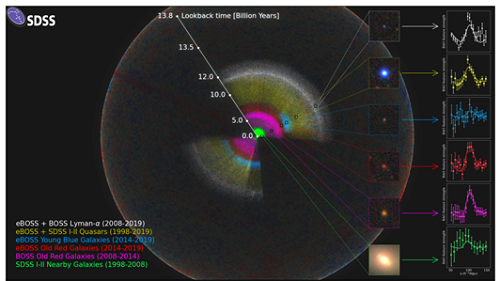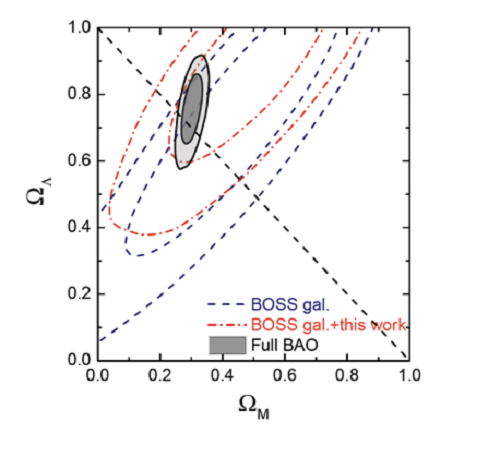On 20th of July, 2020 (Beijing time), the extended Baryon Oscillation Spectroscopic Survey (eBOSS) collaboration released the latest scientific results in over 20 papers, including two studies on dark energy, led by Profs. Gong-Bo Zhao and Yuting Wang from National Astronomical Observatories, Chinese Academy of Sciences (NAOC), respectively.
Based on the eBOSS observations, Zhao’s team successfully measured the history of the cosmic expansion and structure growth in a huge volume in the past Universe, corresponding to a distance range between 0.7 and 1.8 billion light years away from us, which has never been probed before (Fig. 1).
This study took the advantage of a method called the “multi-tracer analysis”, with a new development to mitigate the observational systematics proposed and implemented by Zhao and Wang. “This work”, said Zhao, “detected the existence of dark energy at a significance of 11 s, which is the strongest evidence ever on dark energy from galaxy surveys (Fig. 2). The eBOSS observations are consistent with the dynamical dark energy, which was probed by our team using the BOSS survey 3 years ago”.
One of the biggest challenges of cosmological implications of galaxy surveys is data analysis, especially on developing new methods to improve the statistical accuracy and to mitigate the systematics. eBOSS, as a first galaxy survey that observes multiple types of galaxies in a vast cosmic volume, makes it possible for a multi-tracer analysis, as shown in Fig. 3.
Wang explains, “Cross-correlating multiple types of galaxies is an efficient way to reduce statistical uncertainties, with observational systematics mitigated at the same time, which is key to obtaining robust cosmological results.”
Weibing Zhang, a graduate student at NAOC, is involved in this project by building a theoretical template for cosmological analysis. “This is the very first scientific project of mine, so I was not confident enough in the beginning to work in such a large international collaboration. But I made it in the end, and feel happy that my theory work is recognized by the community. I really have benefited a lot from contributing to this project.”
Dark energy is dominating the current Universe, so it is vitally important to reveal its nature. The eBOSS collaboration, which consists of over 30 top research institutes on astronomy around the world including NAOC, was formed for tackling the problem of dark energy. Operating since 2014, eBOSS has taken over 1 million spectra in the redshift range of 0.6.
Being a science working group chair of eBOSS since 2015, Zhao plays a key role in leading the collaboration on observations, data analysis and cosmological implications. Although eBOSS has completely its mission, it is a starting point of the next chapter. The experience with eBOSS is valuable for cosmology with larger galaxy surveys, including the Chinese Space Station Telescope (CSST), Dark Energy Spectroscopic Instrument (DESI) and Prime Focus Spectrograph (PFS).
This work is supported by Natural Science Foundation of China (NSFC), Ministry of Science and Technology of China (MOST) and Chinese Academy of Sciences (CAS).

Figure 1. The exploration of the Universe by the SDSS mission during the past two decades (1998-2019). Credit: the eBOSS collaboration.

Figure 2. The constraint on the energy budget of the Universe, including that for dark energy and matter. Credit: Zhao et al (eBOSS collaboration), 2020.

Figure 3. The anisotropic correlation function measured from the eBOSS DR16 sample using the emission line galaxies (left), the luminous red galaxies (right), and their cross-correlation (middle). Credit: Wang et al (eBOSS collaboration), 2020.
The papers from NAOC can be accessed at https://arxiv.org/abs/2007.09010 and https://arxiv.org/abs/2007.09011

Address: 20A Datun Road, Chaoyang District, Beijing, China code: 100012
Tel: 010-64888708 E-mail: naoc@nao.cas.cn

